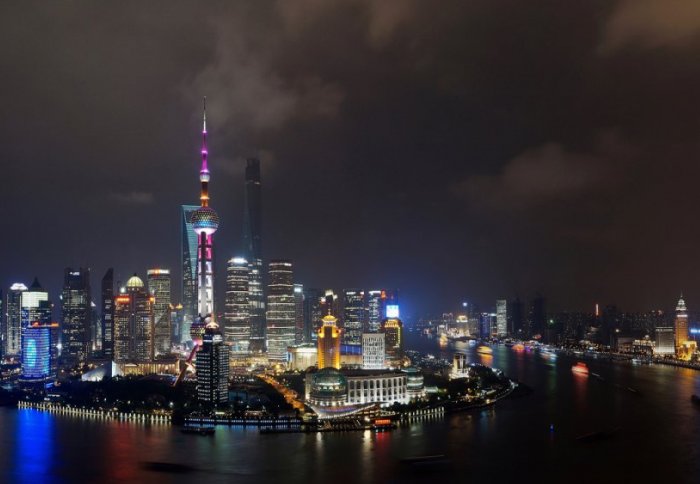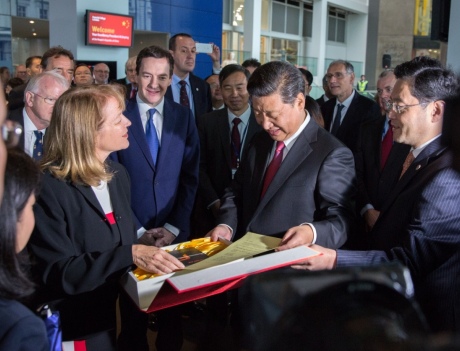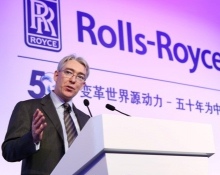China's "new innovation landscape" debated at global summit

An "eastward innovation shift" is transforming higher education and business, according to an expert panel led by Imperial's President Alice Gast.
Speaking at Going Global, a major international summit in Westminster, Professor Gast chaired a panel with Matt Durnin of the British Council, which organised the conference, Michael Hill-King of Huawei and Patrick Horgan of Rolls-Royce.
All have extensive experience in China and work for organisations with deep ties to Imperial. Rolls-Royce’s collaborations with Imperial include two University Technology Centres and Huawei’s include a Data Science Innovation Laboratory.

Huawei supports Imperial's Data Science Institute
The group debated China’s challenges, including an ageing population, slowing economy and the need to escape the middle income trap, but also the ways in which innovation is propelling growth.
China’s “triple helix” of government, industry and academia is supported by a “tremendous investment in innovation,” Professor Gast said.
Drawing on Imperial’s experience as the UK’s top STEM collaborator with China, Professor Gast said: “This investment in higher education is paying off. You see it in the facilities, people and research outputs.” In recent times, “we have gone from working occasionally with Chinese partners to becoming equal collaborators,” she added.
Imitation to innovation
The triple helix’s worldwide impact can be seen in “Chinese firms like Alibaba, taking a primary position in globalisation. As we work across borders, Chinese companies have a central role,” said Professor Gast, referencing an FT feature on the company’s “do-it-yourself globalisation.”
When President Xi Jinping visited Imperial in 2015, “he spoke about mass entrepreneurship and mass innovation… it’s incredible for high level government leaders to say ‘go forth and be entrepreneurial,’” noted Professor Gast.

President Xi Jinping with Alice Gast at Imperial
But as Patrick Horgan went on to argue, "state directed innovation" can be "unproductive" in contrast to "cutting edge private sector innovation," from MNCs like Vodafone and Huawei in China
Professor Gast cited Imperial’s Professor George Yip, who says “China has moved from imitation to innovation”.
“There is also another helix of money, people and environment” needed to spur innovation, so that people can “take intellectual and financial risks in an environment that encourages collaboration”, she added.
R&D or just D?
This is China's moment.
– Matt Durnin
British Council
Professor Gast said: “All over the world, corporations and communities look to universities and small companies to fuel innovation, benefit society and make our lives better.” However, "Most R&D investment is D" - it is focused on development and incremental improvements rather than frontier research.
Matt Durnin, a British Council specialist in the economics of education who has spent a decade living in China, echoed this: "Universities like Imperial have high level productive relationships with companies like Huawei, but most activity is in SMEs and small margin businesses with incremental innovations."
Huawei’s Michael Hill-King, a former Imperial staffer, drew attention to the importance of "collaboration... not just incremental R&D" for Huawei, a company that invest $11 billion per year on R&D.  Mr Durnin spoke about “the new innovation landscape” where an ever greater portion of global research originates in China; “This is China’s moment.” This creates “the challenge of moving beyond individual relationships and towards deeper research relationships.” He asked: “how can we in higher education build on our position at the forefront of innovation and entrepreneurship?”
Mr Durnin spoke about “the new innovation landscape” where an ever greater portion of global research originates in China; “This is China’s moment.” This creates “the challenge of moving beyond individual relationships and towards deeper research relationships.” He asked: “how can we in higher education build on our position at the forefront of innovation and entrepreneurship?”
Patrick Horgan, the Beijing-based regional director for North-East Asia at Rolls-Royce, warned against generalisations. There is a "challenge of local versus national data points" in a country as enormous as China, which can be "like all of Europe in aggregate," he said. "China is both a developed and a developing economy. And it is both of these things at scale."
The war for talent
“It’s not just language that matters, but also cultural understanding.
– Michael Hill-King
Huawei UK
Skills and mobility are crucial for global universities and businesses – and changing in this landscape, the panel agreed.
Huawei places great importance on "the skills and mobility of highly educated and highly trained people" including investment in scholarships for universities and advanced skills programmes, said Dr Hill-King. “The number of top Chinese universities is on the rise," but Huawei is hiring many international graduates: "the top universities in the UK for Huawei PhD recruitment are Imperial, Cambridge and Manchester."
Mr Horgan said that “from a corporate perspective, we look very favourably on people with overseas study experience... they are often a good fit for Rolls-Royce's culture and for other MNCs." Chinese graduates who studied abroad are well positioned.
 One audience question raised the “trope of people from Chinese universities lacking critical thinking and creativity”. Matt Durnin responded: “Blanket statements like that about China may have [been prevalent] 10 years ago, but not anymore…. For example the videogame industry in China has become a global leader despite policy challenges.”
One audience question raised the “trope of people from Chinese universities lacking critical thinking and creativity”. Matt Durnin responded: “Blanket statements like that about China may have [been prevalent] 10 years ago, but not anymore…. For example the videogame industry in China has become a global leader despite policy challenges.”
Patrick Horgan said that the trope “still exists in some people’s minds, but is dangerous as it inculcates complacency,” including from western universities and businesses. Years ago Chinese involvement in facilities like Hinkley Point was unthinkable, showing that we should not underestimate China’s capabilities, he argued.
A further audience question emphasised the growing importance of understanding Chinese language and culture, as Chinese people develop greater linguistic and cultural knowledge too. Mr Horgan, a fluent mandarin speaker, hopes that: “Huawei will invent an AI that will take us to the Douglas Adams Babel fish.” Dr Hill-King added: “It’s not just language that matters, but also cultural understanding.”
Automation for the people?
The group discussed how technological change, especially automation, is changing China. Matt Durnin referenced headlines on Foxconn’s “robot army”, while Professor Gast noted the western populist backlash and concerns that globalisation is leaving many behind" because of "technological change, automation and job losses." She raised the question of an anti-technology or anti-globalisation backlash emerging in China.
As Mr Durnin noted, "Factory jobs are less attractive in today's China and salaries have to be a lot higher." However, as Mr Horgan explained, "attitudes in China to globalisation are very positive - China has been the greatest beneficiary of globalisation… China knows which side its bread is buttered: it benefits from the current open multilateral system."
As the debate concluded, Michael Hill-King said: “Should you collaborate with China’s top universities? If you’re Imperial, yes. But others should find appropriate partners – at, or ideally just above, your level.”
Main picture credit (Shanghai): Romain Pontida.
Article text (excluding photos or graphics) © Imperial College London.
Photos and graphics subject to third party copyright used with permission or © Imperial College London.
Reporter
Andrew Scheuber
Communications Division
